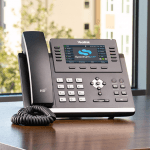In today’s fast-paced work environment, communication plays a crucial role in ensuring smooth and effective operations. While many businesses have transitioned to digital forms of communication, the importance of having up-to-date office phones should not be overlooked. Upgrading your office phones can offer a surprising range of benefits that can enhance productivity, efficiency, and overall employee satisfaction. In this article, we’ll explore some of the unexpected advantages that come with modern office phone systems.
1. Enhanced Audio Quality
Upgrading your office phones means experiencing superior audio quality, reducing misunderstandings and the dreaded need to repeat information during calls. This improvement not only enhances daily operations but also minimizes frustration among employees and clients. Clear communication is the backbone of productive business interactions, and modern office phones ensure that every word is heard as intended. Furthermore, improved audio quality can positively impact client relationships, as it portrays professionalism and ensures that client queries and concerns are addressed accurately.
2. Boosted Productivity
Modern office phones often come equipped with features like call forwarding and conferencing, which streamline communication and save valuable time. By facilitating better multitasking capabilities, these features allow employees to manage their communications effectively, whether they’re in the office or working remotely. Additionally, these systems can integrate with scheduling tools and contact lists, providing a seamless user experience that aids in organizing day-to-day tasks. By leveraging these advanced functionalities, businesses can optimize workflows, ultimately leading to enhanced productivity and job satisfaction.
Moreover, the integration of automated attendant functions that direct calls to the appropriate departments can significantly reduce response times. This means fewer missed calls and more efficient handling of customer inquiries, thus improving client satisfaction. Employees can focus on their core tasks without constantly being interrupted, fostering an environment where productivity thrives.
3. Increased Flexibility and Mobility
Many new office phone systems support mobile integration, allowing employees to stay connected even when they’re out of the office. This flexibility is invaluable, especially for businesses with remote teams or frequent travelers. With features such as call routing to mobile devices and VoIP capabilities, employees can take important calls on the go, ensuring that they remain reachable no matter where they are. This aligns with the growing trend of remote work and gives businesses a competitive edge by offering flexibility without sacrificing connectivity.
4. Scalability for Growing Businesses
As your business expands, modern office phones can easily scale to accommodate new lines and features without significant overhaul costs. This scalability is crucial for businesses that anticipate growth, ensuring that their communication systems can keep pace with their evolving needs. With the ability to add or remove lines effortlessly, companies can adjust their phone systems to match changes in staffing or business focus. This adaptability not only saves time but also reduces the need for frequent technology upgrades, providing a more cost-effective solution for managing communication infrastructure.
Furthermore, this modular approach to phone systems allows for easy integration of future technologies, ensuring that businesses remain at the forefront of communication advancements. With options to customize and choose only the features that align with current business needs, companies can prevent unnecessary expenses and better allocate resources.
5. Improved Security Features
Newer office phone systems offer advanced security features to protect sensitive business communications from unauthorized access. In an era where data breaches are a prevalent threat, leveraging such security measures is paramount. Features like encryption ensure that communication remains private and secure, safeguarding against eavesdropping and interception. Additionally, secure authentication methods add an extra layer of protection, verifying user identities and preventing fraudulent access. As businesses handle an increasing volume of sensitive data, investing in secure communication systems becomes not just beneficial but essential.
6. Cost Efficiency in the Long Run
Though the initial investment might seem high, upgraded office phones can reduce long-term costs through lower maintenance and operational expenses. Modern systems often come with warranties and support services that minimize unexpected repair costs, thus providing a more predictable expense model. In addition, increased reliability means fewer disruptions, translating to time and cost savings in daily operations. With features that streamline communication and improve efficiency, businesses can also reduce overhead costs associated with communication, such as travel or delays due to technical issues.
7. User-Friendly Interfaces
Modern phones have intuitive interfaces, reducing the learning curve for employees and increasing overall satisfaction. These user-friendly designs enable quick adoption and reduce the need for extensive training, allowing employees to focus on their tasks more quickly. Features are designed with the user in mind, often incorporating touchscreens and customizable interfaces for a personalized experience. By minimizing the complexity of operation, these systems encourage use and facilitate better communication practices across the organization.
8. Integration with Business Tools
Integration with CRM and other business tools provides seamless access to information during calls, enhancing customer service. This connectivity allows representatives to access client history and important data instantly, resulting in more informed and personalized interactions. Whether logging call details or tracking customer preferences, this integration improves service delivery and fosters loyalty. Additionally, the ability to sync with other digital tools enhances workflow efficiency by centralizing information and reducing silos.
9. Enhanced Call Management
Features like voicemail to email and automatic call logging simplify call management and archiving. This automation ensures that important messages are never missed and that communication records are easily accessible for reference, compliance, or training purposes. By streamlining these processes, businesses can save time and reduce manual errors. Call management features empower teams to focus on active interactions rather than managing call logs, enhancing the quality and effectiveness of communication.
10. Better Customer Experience
Improved audio quality and call management features lead to a more professional and efficient experience for customers. Providing clients with clear communication reduces frustration and increases engagement, reinforcing their trust in your company. A modern phone system’s ability to handle calls smoothly and direct them to the appropriate departments enhances the overall customer journey. By investing in these tools, businesses demonstrate their commitment to exceptional service, leading to a stronger brand reputation and customer loyalty.
11. Environmentally Friendly Options
Some modern office phone systems are designed with sustainability in mind, reducing your company’s carbon footprint. Energy-efficient models consume less power and utilize materials that are environmentally friendly, supporting sustainability initiatives. The transition to digital communications also reduces reliance on physical resources, such as paper and traditional telephony infrastructure, contributing to decreased environmental impact. Embracing greener technologies not only supports corporate responsibility but can also appeal to eco-conscious clients and stakeholders.
12. Reduced Downtime
Reliable modern systems are less prone to malfunctions, ensuring consistent communication capabilities. Improved durability and state-of-the-art technology mean fewer interruptions, which can otherwise disrupt business operations. Businesses benefit from stable communication lines and are better equipped to handle peak traffic times without issue. Less downtime keeps operations running smoothly and employees focused on their responsibilities, maximizing productivity.
In addition, many modern phone systems offer remote diagnostics and support, enabling quick responses to any issues that might arise. This proactive approach minimizes potential disruptions and helps maintain a high level of availability and service.
13. Customization for Your Needs
Many office phones offer customizable features, allowing businesses to tailor the system to their specific communication needs. This flexibility means companies can choose from a variety of features and options that best suit their workflow, employee count, and industry-specific requirements. From customizing ring tones to configuring complex call-routing rules, these systems adapt to support diverse business models. This level of customization ensures that each aspect of the phone system contributes positively to the overall efficiency and productivity of the team.
14. Real-Time Data and Insights
Access to call analytics helps businesses understand communication patterns and improve strategies. By examining metrics such as call duration, frequency, and peak times, companies can identify areas for improvement and optimize resource allocation. These insights support data-driven decision-making, helping businesses to enhance customer service, refine marketing strategies, and boost operational efficiency. Leveraging real-time data allows companies to stay agile and ahead of the curve in an ever-changing market landscape.
15. Support for Remote Work
With remote work becoming more common, modern phones support seamless transitions between in-office and remote communication. Features such as cloud-based connections and mobile apps allow employees to maintain productivity regardless of their location. As businesses continue to adapt to a more flexible work environment, these systems provide the tools needed to ensure that remote teams remain cohesive and connected. By facilitating communication across distances, upgraded office phones play a critical role in supporting a remote-first work culture and driving success in the digital age.




